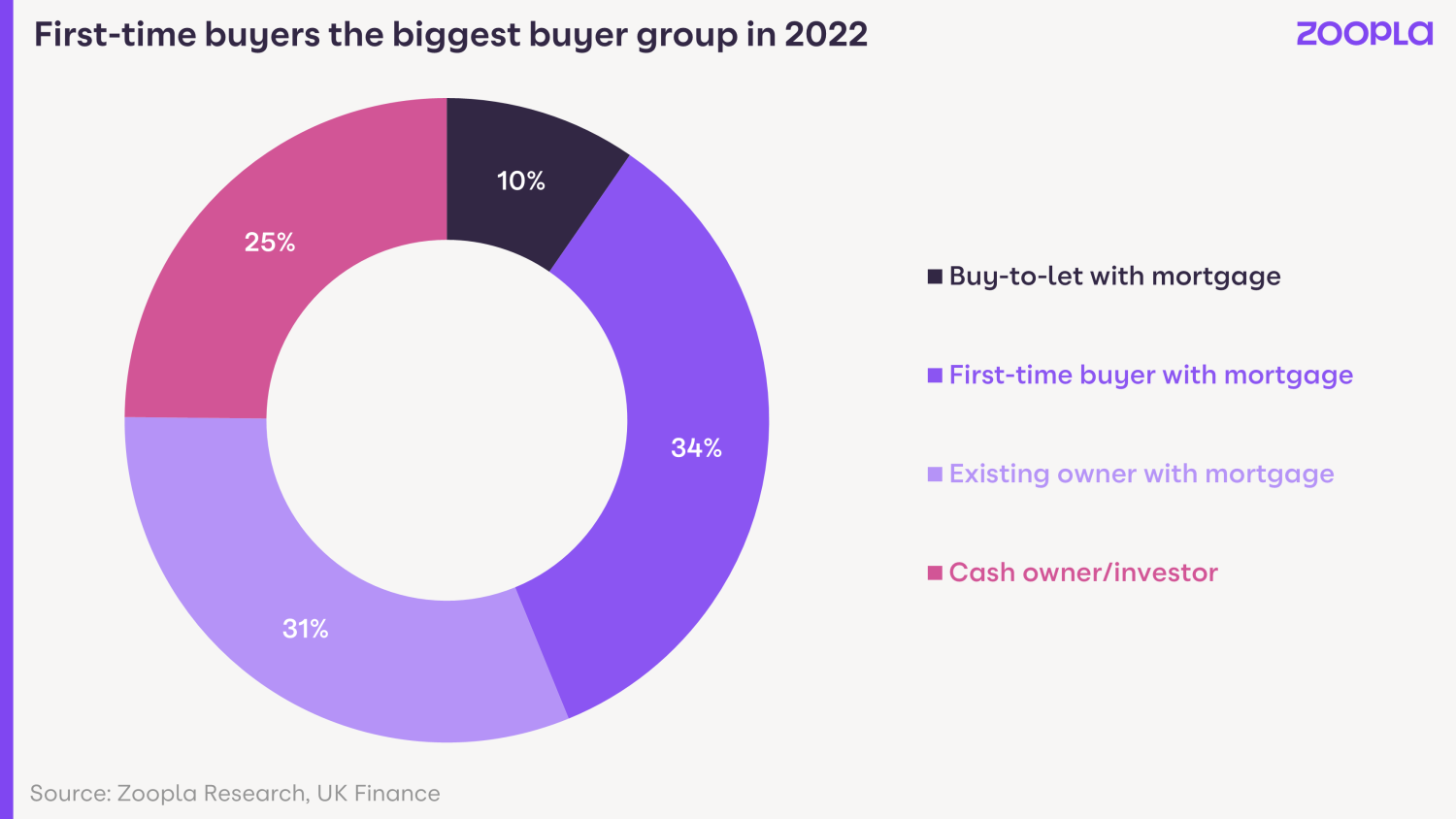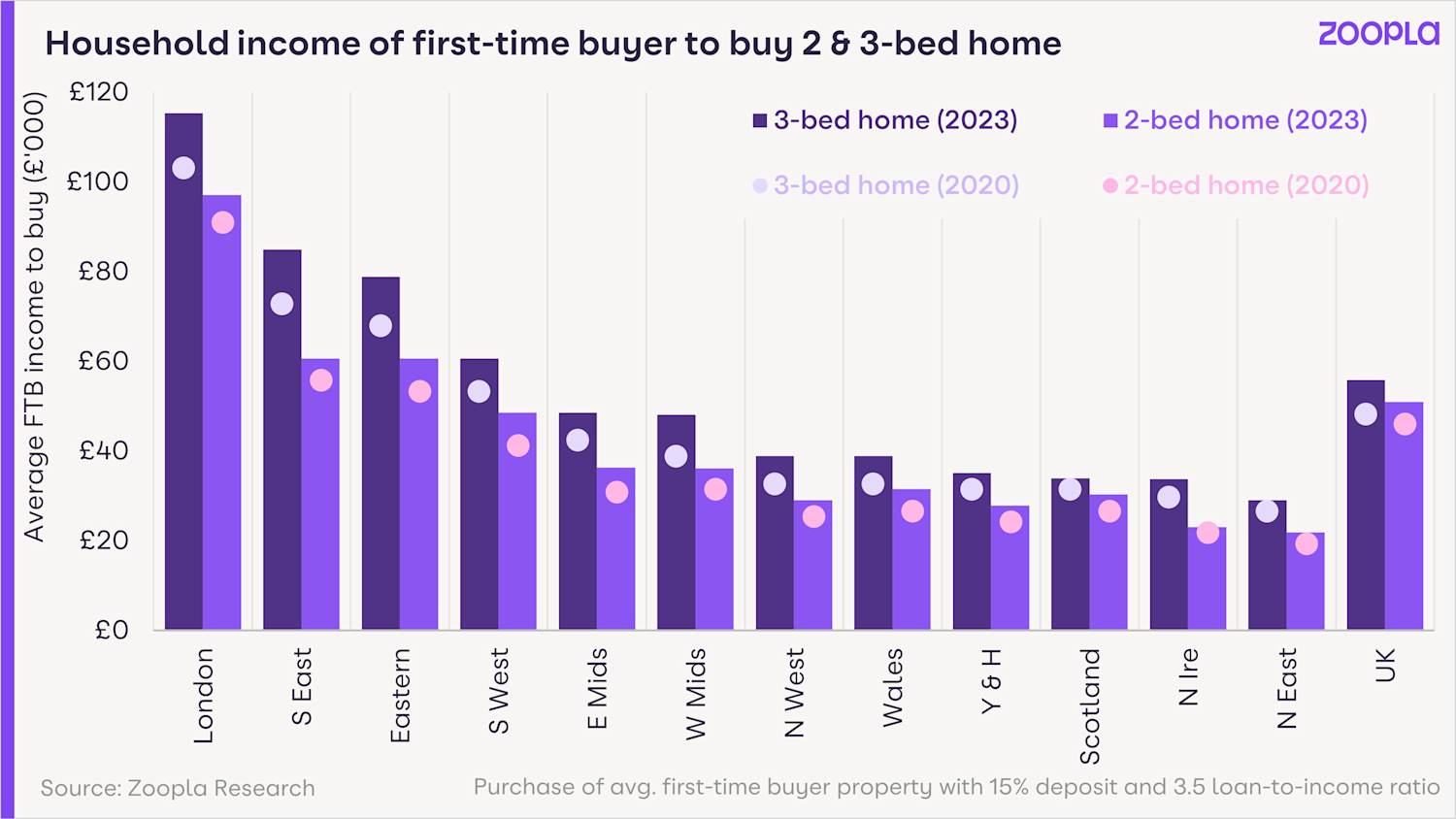The rapid rise in house prices over the last three years means first-time buyers now need to earn more to buy a home. Let’s look at the options.
Higher mortgage rates have a major impact on first-time buyers.
But many first-time buyers come from the rental market, where there have been steep increases in rental costs over the last year, with rents up £1,120.
This, combined with a chronic shortage of supply, which is currently down by a third, is now pushing more first-time buyers towards home ownership.
In fact in 2022, first-time buyers have proven to be highly resilient. We estimate that first-time buyers using a mortgage accounted for over 1 in 3 sales last year (34%).
This made them the largest group of home buyers, followed by existing owners using a mortgage (31%) and cash buyers (25%).

The main constraints to stepping onto the property ladder for first-time buyers are access to a suitable deposit and the right level of income to afford a mortgage.
While the jump in house prices over the last 3 years has increased the amount of income and deposit needed to buy a first home.
How much money do first-time buyers need?

First-time buyers now need to earn nearly £7.5K more to buy a home than they did in 2020.
That means you’ll need to earn a household income of £55,900 for a 3 bed home, or £51,000 for a 2 bed home (an increase of £4,900) .
In London and the South East, the income needed to buy a home has now increased by over £12,000 to buy a 3-bed home and £7,300 to buy a 2-bed home.
Yet wages have only risen by £4,800 since 2020, according to the Office for National Statistics.
The average amount needed for a house deposit has also risen.
For the average three-bed home costing £230,000, a first-time buyer would need to have a deposit of £34,500 (an increase of nearly £5,000).
For a two-bed home costing £210,000, you would need a deposit of £31,500 (an increase of £3,000).
Traditionally, 3-bed houses have been the most popular choice for first-time buyers, but we are seeing clear evidence of first-time buyers seeking better value for money with one and two-bed flats.
The ability to work from home has also enabled first-time buyers to look further afield to secure the home they need at the right price.
So what can first-time buyers do in 2023?
A quick checklist:
1: Save for a larger deposit
One option is to try and save for a larger deposit, which may be challenging when rental costs are taking up a larger portion of people’s earnings.
2: Borrow from the bank of mum and dad
Another might be to borrow from the ‘bank of mum and dad’ if that’s a possibility.
3: Look to buy a more affordable home
We’re seeing that some first-time buyers are looking to purchase cheaper and lower-cost homes.
Lower mortgage rates in recent years have enabled first-time buyers to purchase larger, typically 3-bed homes.
But higher mortgage rates and prices are now pushing some to adjust their requirements, particularly in the areas where prices have increased the most since 2020.
Three-bed homes are still the most in-demand property type but buyer interest has fallen back to 40% in Q1 2023, while demand for 1 and 2-bed flats increases.
Outside of London, the average asking price for a 2-bed flat (£200,000) is 29% lower than a 3-bed house (£280,000).
4: Take out a longer term mortgage
Finally, you might consider taking out a longer term mortgage.
In the past, mortgage terms have usually been around 25 years.
But there has been a steady increase in the number of mortgages with terms of over 30 years.
Taking out a 35-year loan gives buyers an extra 20% boost to buying power, compared to a 25 year loan.
But it’s important to be aware that this comes at the cost of an extra 48% in mortgage interest payments over the longer term.
Key takeaways
- Rising rents and a shortage of rental properties are pushing more renters to become first-time buyers
- In 2023, first-time buyers need to earn a household income of £55,900 to buy a 3-bed home, or £51,000 to buy a 2-bed home
- There are options available for first-time buyers, including saving for larger deposits, extending the mortgage term or looking for more affordable housing in less expensive areas
